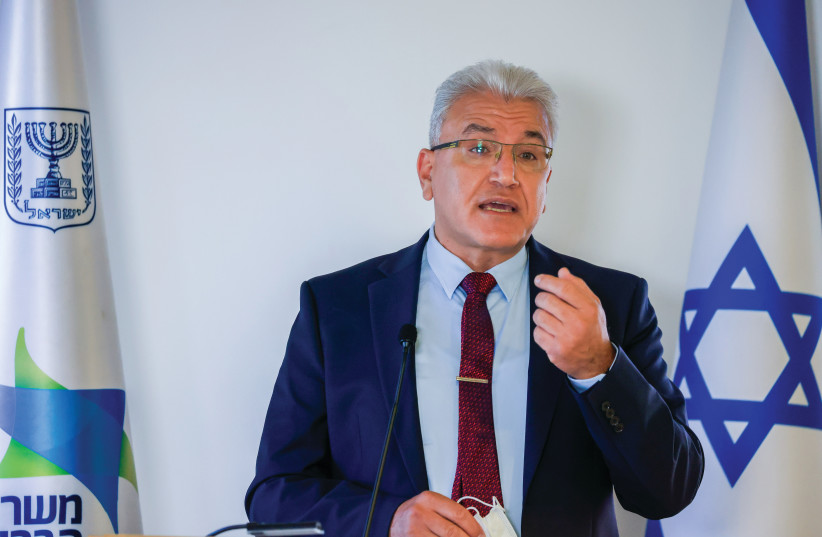The numbers of infected with a subtype of the Omicron variant of COVID-19 and of high-risk patients who have been hospitalized – even some in critical condition – have increased, but the Health Ministry hopes it will not develop into an additional “wave” or bring to Israel a new variant, so declared Prof. Salman Zarka, the ministry’s COVID-19 commissioner, in an online briefing for health journalists on Wednesday.
“We are happy that life has returned to normal, but it seems we will have to live with COVID-19 for a long time, so those at high risk must be protected. No new mandatory rules are being established”
Coronavirus Commissioner Prof. Salman Zarka
He added that he trusts the public, especially those at high-risk due to age or chronic diseases and those in close contact with such people – to complete their vaccinations (three from children through age 60 and four for the elderly and of younger ages with chronic diseases). Wearing masks in closed spaces is not being mandated by law, but it is a recommendation for those at high risk and those in contact with them, as in geriatric facilities, Zarka said.
In recent months, there have been only handfuls of people hospitalized due to COVID-19 complications, but the numbers have risen. Israel’s largest hospital, Sheba Medical Center at Tel Hashomer, reported on Wednesday that it now has 20 COVID patients, three of them in critical condition.
The increase in infections results from the spread of BA5, a subtype of Omicron (BA1), but other subtypes such as B2 and B4 remain in the country and the world, said the project manager. The R value indicating infection is “not stable, but since people go for testing only voluntarily, it is not a reliable gauge of the situation,” he said.

The Health Ministry’s interdisciplinary team for monitoring epidemics just held another meeting, but the participants saw no reason at this time to offer a fifth vaccine to those at high risk. This is true even though some of the protection against infection has certainly dissipated, although being fully vaccinated in the past will undoubtedly minimize the risk of hospitalization and mortality, Zarka said.
The ministry’s pandemic team remains intact, and it has just now held a simulation of what would happen if a new variant appears.
“We are well prepared,” Zarka said. “I don’t know if this signals the beginning of yet another wave. We recommend to those at high risk to take care of themselves and to wear masks in closed areas and to get tested if exposed to infected people.”
The four public health funds have special drugs that can be dispensed to infected patients at high risk to prevent their hospitalization, he said, adding that the ministry supplies all geriatric institutions with antigen kits to identify infected patients and to would-be visitors who can test themselves before coming to see relatives and friends.
Zarka also recommended that Israelis returning from abroad, especially if they have symptoms, should undergo PCR tests (more accurate than home-based antigen tests) and stay at home if they test positive. This will help the ministry determine if a new variant has arrived.
Israelis cannot dismiss COVID-19 infection rise
According to Prof. Hagai Levine, a senior epidemiologist at the Hebrew University-Hadassah Braun School of Public Health and Community Medicine and chairman of the Israel Association of Public Health Physicians, the public should not dismiss the rise in infections.
“We have had over 10,000 who died of COVID-19 complications, and there will be more,” he told The Jerusalem Post in an interview. “It is a danger to [the] public. But there is no reason for hysteria. We have to set the proper balance. We want the pandemic to end completely, but now we face a different reality.”
Dr. Itamar Offer, president and chairman of Sabar Health, which operates a home-hospitalization service on behalf of the four public health funds, called on the public to apply for hospital care at home if needed.
“We hope the current situation will pass without complications and [will] be [a] lighter wave than before so that the elderly will not need to be hospitalized,” he said. “But if so, we call on the public to learn from the lessons of previous waves and ask for the option of hospitalization at home as an alternative to hospitalization.”
Sabar's home-hospitalization system is providing round-the-clock care at no cost to the patient and as part of the health basket. It is intended for coronavirus patients, giving them medical care at least once a day at home. Their care is provided by a team of physicians and nurses, including preparation of a treatment plan, prescriptions and medical examinations. A referral for home hospitalization can be made by the attending health fund’s physician or an emergency-room physician.
Meanwhile, the World Organization of Synagogues said maximum ventilation and the intake and exit of outside air via air conditioning or windows must be ensured to reduce the risk of infection among worshipers and protect the at-risk populations as much as possible.
“In synagogues where it is not possible to maintain maximum ventilation, worshipers should be advised to wear masks, with an emphasis on prayers where the number of worshipers is large or when there is not a sufficient distance between the worshipers,” it said. “It is recommended that those who belong to the risk groups wear a mask during their stay in the synagogue. In those where many people in high-risk groups pray, worshipers should also show responsibility and wear a mask so as not to endanger the public.”
